Governor signs FY 2025 budget
 Gov. Gretchen Whitmer has signed the FY 2025 budget into law, now designated as Public Act 121 of 2024. This budget brings a host of changes and allocations that impact Michigan counties. The most significant change comes in a $30 million increase in county revenue sharing. This increment is on top of the ongoing funding from FY 2024 and will be distributed to counties based on an inverse relationship to taxable value. The Department of Treasury has yet to finalize the distribution calculations, but updates will be provided as soon as they become available.
Gov. Gretchen Whitmer has signed the FY 2025 budget into law, now designated as Public Act 121 of 2024. This budget brings a host of changes and allocations that impact Michigan counties. The most significant change comes in a $30 million increase in county revenue sharing. This increment is on top of the ongoing funding from FY 2024 and will be distributed to counties based on an inverse relationship to taxable value. The Department of Treasury has yet to finalize the distribution calculations, but updates will be provided as soon as they become available.
Justice System Funding
The County Jail Reimbursement Program receives a $5 per diem rate increase.
Michigan Indigent Defense Commission (MIDC)
A total of $37.4 million has been allocated to support grant distributions to district and circuit court funding units for the state’s share of the FY 2025 costs for MIDC standards.
The breakdown is as follows:
- $24.6 million for standards 1, 2, 3, 4, 5, and 8
- $12.9 million for standards 6 and 7
Kent and Macomb County Judgeships
The budget provides $305,500 for the partial year costs of two new judgeships—one in Kent County’s district court and another in Macomb County’s probate court.
Local Prosecutor Support Grants
To alleviate the workload on county prosecutors, $17 million has been set aside for grants to the 15 counties with the highest rates of violent crime per 1,000 residents. The funds will be distributed based on the population of each county, multiplied by $7.50.
Stormwater Management
The budget includes $10 million in ongoing funding for stormwater management planning grants and $300,200 in one-time funding.
Roads
While the budget does not allocate state dollars for a pilot project on mileage-based user fees, it does provide $74.5 million for 30 “Critical Infrastructure Projects.”
Elections
To support counties with the implementation costs associated with Proposals 1 and 2, and for financial disclosure investment grants, $1.5 million has been allocated.
Certified Community Behavioral Health Clinics (CCBHCs)
An investment of $161.8 million, including 12 full-time employees, is aimed at expanding CCBHCs into additional counties, along with conducting a study on the program.
Opioid Healing and Recovery Fund
$10 million has been designated on a one-time basis for regional community health entities, known as Prepaid Inpatient Health Plans (PIHPs).
Ground Emergency Medical Transport (GEMT)
A one-time fund of $500,000 will create a system for recording and accepting Medicaid reimbursement for emergency transport services.
Runaway and Homeless Youth Grants
The budget includes $5.3 million to support the expansion of runaway and homeless youth programs across various counties, including infrastructure and technology upgrades.
County Child Care Fund
An increase of $9.1 million was appropriated for the County Child Care Fund.
Foster Care Payments
The budget provides $16.9 million for foster care payments.
Housing
An appropriation of $5 million has been allocated for services to unhoused individuals in Genesee County, with an additional $10 million dedicated to affordable housing initiatives in the same region.
For more information on this issue, contact Deena Bosworth at bosworth@micounties.org.
Counties now can sign on to Kroger opioid settlement
 In September 2023, a settlement with Kroger was reached. This settlement will pay around $1.2 billion to states and subdivisions nationally and payment will be made over an 11 year period. In Michigan, local governments have the opportunity to sign-on to receive these additional funds between mid-July and mid-August of 2024.
In September 2023, a settlement with Kroger was reached. This settlement will pay around $1.2 billion to states and subdivisions nationally and payment will be made over an 11 year period. In Michigan, local governments have the opportunity to sign-on to receive these additional funds between mid-July and mid-August of 2024.
To see the estimated total amount of funds for your county, you can visit MAC’s Opioid Settlement Resource Center website.
For more detailed payment information, such as expected payments by settlement by year, visit the Michigan Department of Attorney General Opioid Settlement Payment Estimator tool.
For mor information or for technical assistance with opioid settlement planning and spending, contact Amy Dolinky at dolinky@micounties.org.
Michigan gets $130M in federal help for clean energy projects
 Nearly $130 million in federal aid will be made available for clean energy projects in Michigan, part of which will be used for financial incentives for locals to welcome utility-scale wind and solar projects to their communities.
Nearly $130 million in federal aid will be made available for clean energy projects in Michigan, part of which will be used for financial incentives for locals to welcome utility-scale wind and solar projects to their communities.
The investment will help Michigan meet its goal of 60 percent renewable energy by 2030, a plan that was approved by the Legislature late last year with Public Act 235. The Environmental Protection Agency (EPA) allocated these funds to states that were aggressive in renewable energy policies. Governor Whitmer advocated for the clean energy package, as well as the renewable energy siting reform bills, in order to receive these funds.
The Renewables Ready Communities Award pilot will make available $30 million for local governments “that approve and host utility-scale renewable energy and energy storage through local processes.” Locals can be granted $5,000 per megawatt for projects with at least 50 megawatts of energy. The maximum amount a local can receive is $3 million for a single project.
The remainder of the $129.1 million will be used to incentivize developers to build renewable energy projects brownfield sites, technical support, workforce development and strategic planning.
For more information on this issue, contact Madeline Fata at fata@micounties.org.
 Congressional committee advances changes to child welfare
Congressional committee advances changes to child welfare
Legislation to improve federal Title IV-B programs for child welfare and workforce recruitment and retention to serve families in poverty passed unanimously this week in the U.S. House Committee on Ways and Means.
H.R. 9076 updates Title IV-B, set to expire on Dec. 31, 2024, which currently lacks significant funding. The improvements, if passed, include a $300 million increase in mandatory funding over four years. This increased funding would assist those suffering from substance use disorders, improve child welfare legal proceedings, and dedicated funding for tribes.
MAC and NACo support H.R. 9076, allowing counties to continue to provide quality services to at-risk children and their families involved in the child welfare system.
For more information on this issue, contact Samantha Gibson at gibson@micounties.org.
Legislative Update takes mid-summer hiatus
MAC’s weekly email blast to members, Legislative Update, will not be released on Friday, Aug. 2 or Friday, Aug. 9 due to staff attendance at MAC and regional events.
Legislative Update will return to its regular Friday releases on Friday, Aug. 16.
 Staff picks
Staff picks
- State budgets are downsizing (Pew Trusts)
- New state funding not enough to solve shortage of prosecutors, counties say (Bridge Michigan)
- What does an overdose prevention center look like? (OPCIinfo.org)
- Michigan wildlife officials discuss changing state’s deer hunt regulations (Michigan Public Radio)

 Fifteen of the 83 counties will receive some of a $17 million appropriation in the state’s FY25 budget for their prosecutor’s office to reduce the caseload per attorney. These grants are meant to address the severe prosecutor shortage plaguing every county in Michigan.
Fifteen of the 83 counties will receive some of a $17 million appropriation in the state’s FY25 budget for their prosecutor’s office to reduce the caseload per attorney. These grants are meant to address the severe prosecutor shortage plaguing every county in Michigan. How county leaders can assist the growing number of Michigan households experiencing financial hardship is the focus of
How county leaders can assist the growing number of Michigan households experiencing financial hardship is the focus of 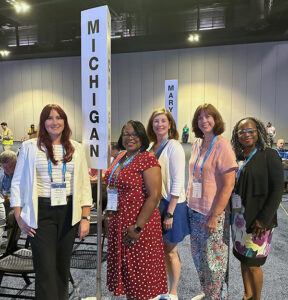 “The advent of generative artificial intelligence (GenAI) worldwide presents unique opportunities and challenges for county governments,” states
“The advent of generative artificial intelligence (GenAI) worldwide presents unique opportunities and challenges for county governments,” states  A national webinar on July 24 will focus on new federal requirements for county websites and mobile apps.
A national webinar on July 24 will focus on new federal requirements for county websites and mobile apps.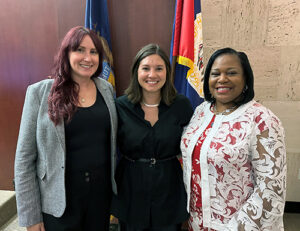 MAC on the road in Wayne County
MAC on the road in Wayne County It’s been two weeks since the Legislature passed the FY 2025 budget that
It’s been two weeks since the Legislature passed the FY 2025 budget that  A ballot drive for the statewide elimination of property taxes will not be on the November 2024 ballot after proponents failed to gain the necessary signatures by a July 8 deadline.
A ballot drive for the statewide elimination of property taxes will not be on the November 2024 ballot after proponents failed to gain the necessary signatures by a July 8 deadline.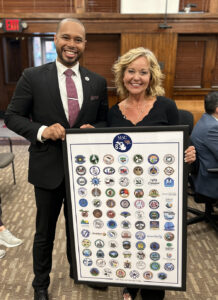 MAC on the road: Washtenaw County
MAC on the road: Washtenaw County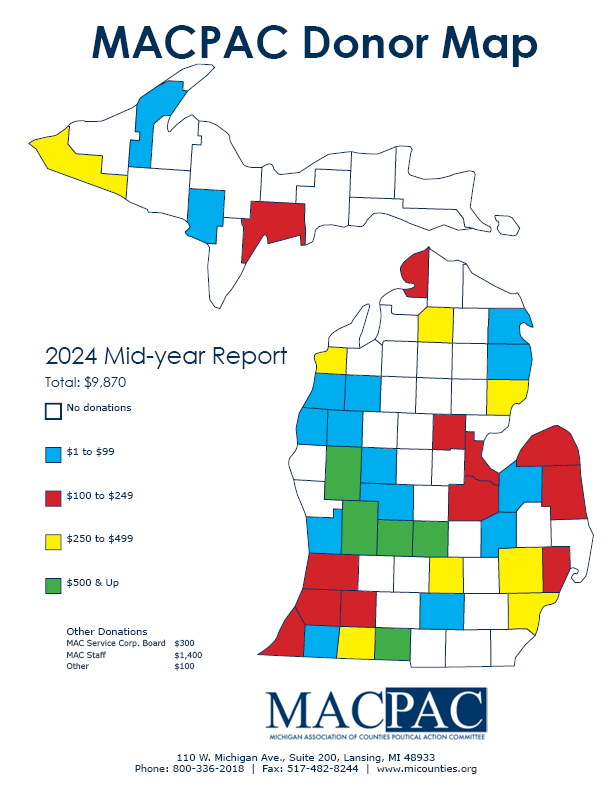
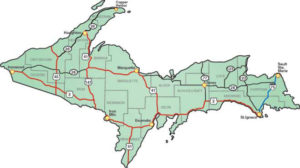 The Michigan Public Service Commission (MPSC) is holding a July 30 hearing in Marquette for public comment on the commission’s ongoing UP Energy Study.
The Michigan Public Service Commission (MPSC) is holding a July 30 hearing in Marquette for public comment on the commission’s ongoing UP Energy Study.  In the wee hours of Thursday morning, the Legislature adopted a fiscal 2025 budget that includes a $30 million increase in county revenue sharing.
In the wee hours of Thursday morning, the Legislature adopted a fiscal 2025 budget that includes a $30 million increase in county revenue sharing. MAC’s advocacy team identified the following line items by service area affecting counties in the fiscal 2025 state budget.
MAC’s advocacy team identified the following line items by service area affecting counties in the fiscal 2025 state budget. Developers are encouraged to work with local governments in
Developers are encouraged to work with local governments in  Staff investments coming from budget for medical care facilities
Staff investments coming from budget for medical care facilities MAC holiday information released
MAC holiday information released





